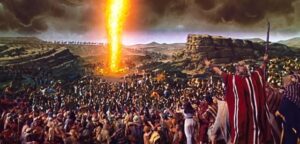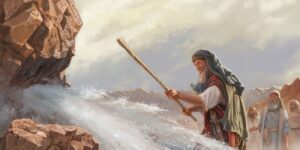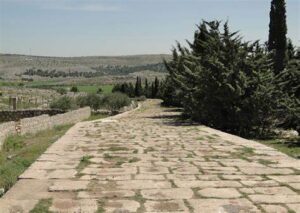 Obedience
Obedience
Seven Dispensations of Man – The Dispensation of Law
Quick Review
I have presented,
- The Dispensation of Innocence which covers the creation of mankind and his relationship with God through his fall into sin. This resulted in separation from God and expulsion from the Garden of Eden.
- The Dispensation of Conscience which illustrates mankind’s plunge into degradation because they live solely by the convictions of their own conscience. The resulting evil caused God to regret he made man. This period ends in The Great Flood which spared only eight people.
- The Dispensation of Human Government which shows mankind, united in one language, preferred to collaborate among themselves rather than seek counsel of God. This arrogance led to their language being “confused” birthing the world’s languages which forced them to separate from one another.
- Dispensation of Promise where God sequesters for himself a forever people in Abraham. The Abrahamic Covenant promises that through him the nations of the world would be blessed. This was a reference to the promise of a Savior that would come through Abraham’s seed.
The fifth dispensation, The Dispensation of Law covers a lot of biblical ground in the Old Testament. Only a few events will be highlighted to give a flavor of what was happening during this period.
The Dispensation of Law
Time Period:
From Israel’s exodus from Egypt through the death of Jesus Christ (1451 BC-33 AD).
Bible Books Covered:
Exodus -Acts 1:1-11
People Focus:
The Hebrew Nation
God-Man Relationship:
The Hebrew nation struggles to keep the Law of God.
Highlighted Events:
-
Call of Moses

- A type of Christ who saves Israel from bondage in Egypt as Christ saves the world out of the bondage of si
-
Passover
- Firstborn of Egypt, man and beast slain (Exodus 12).
To avoid the plague of death, Israel had to apply the blood of a lamb over their doorposts. The lamb had to be a male under one year old (innocent), perfect (no blemishes) and it had to be loved. Hence the lamb was taken into the home where it was cared for and nourished four days before it was slaughtered. Strong parallels can be made from the sacrifice of this lamb to the sacrifice of the eternal Lamb of God who when his blood is applied to the soul saves us from an eternal spiritual death.
-
Festival of Unleavened Bread
Israel had to eat the roasted lamb with bread made without yeast (yeast is symbolical of sin) and with bitter herbs. This is the Festival of Unleavened Bread for the Jews and synonymous the communion instituted by Christ in the New Testament.
-
Mosaic Covenant
Where the Abrahamic Covenant was an unconditional, everlasting covenant the Mosaic is not. Deuteronomy 11 provides the details.
-
- Israel will have victory over their enemies
- Everywhere they place their feet belongs to them
- They will harvest the goodness of the land
The Condition?
-
- They must be obedient to the Lord’s commands that they receive the blessing and not a curse.
-
The Exodus

-
- Israel led by a cloud by day and fire by night which were angels who had taken on the form of a pillar of cloud and a pillar of fire (Exodus 14:19).
- An eleven-day journey to Canaan took 40 years because of Israel’s faithlessness
-
Wilderness Testing
- Tested with basic needs – thirst
- Tested with conflict – Twelve Hebrew spies sent into Canaan and 10 return with a message of defeat then rally the people to return to Egypt
- Tested with Moses’ absence – Moses is on Mt. Sinai 40 days and nights. Israel breaks with the God of Moses and makes a golden calf their god and assign it the credit for leading them out of captivity!
Exodus 32:4-5 NIV
4 He took what they handed him and made it into an idol cast in the shape of a calf, fashioning it with a tool. Then they said, “These are your gods, Israel, who brought you up out of Egypt.”
5 When Aaron saw this, he built an altar in front of the calf and announced, “Tomorrow there will be a festival to the Lord.”
Aaron gave a hilariously childish explanation to Moses as to the appearance of the golden calf.
Exodus 32:21-
21 He said to Aaron, “What did these people do to you, that you led them into such great sin?”
22 “Do not be angry, my lord,” Aaron answered. “You know how prone these people are to evil.
23 They said to me, ‘Make us gods who will go before us. As for this fellow Moses who brought us up out of Egypt, we don’t know what has happened to him.’
24 So I told them, ‘Whoever has any gold jewelry, take it off.’ Then they gave me the gold, and I threw it into the fire, and out came this calf!”
Seriously Aaron?
-
Moses’ Sin
Israel was complaining of thirst to Moses. The following is the action Moses took which cancelled his pass into the Promised Land.
Numbers 20:7-12 NIV
7 The Lord said to Moses,
8 “Take the staff, and you and your brother Aaron gather the assembly together. Speak to that rock before their eyes and it will pour out its water. You will bring water out of the rock for the community so they and their livestock can drink.”
9 So Moses took the staff from the Lord’s presence, just as he commanded him.
10 He and Aaron gathered the assembly together in front of the rock and Moses said to them, “Listen, you rebels, must we bring you water out of this rock?”
11 Then Moses raised his arm and struck the rock twice with his staff. Water gushed out, and the community and their livestock drank.
12 But the Lord said to Moses and Aaron, “Because you did not trust in me enough to honor me as holy in the sight of the Israelites, you will not bring this community into the land I give them.”

God was not alarmed that the people needed to drink rather He was alarmed at the bravado Moses exercised when he provided water to drink. Not only did he take on a pious attitude but he did not follow instructions. For these reasons God basically told Moses he would not enter Canaan because he exalted himself rather than God. This is a clear warning to all who choose to exalt themselves by building churches and kingdoms in their names instead of God’s!
-
Joshua and the Conquest of Canaan
Judges 2:6.7,10, 11 NIV
6 After Joshua had dismissed the Israelites, they went to take possession of the land, each to their own inheritance.
7 The people served the Lord throughout the lifetime of Joshua and of the elders who outlived him and who had seen all the great things the Lord had done for Israel.
10 After that whole generation had been gathered to their ancestors, another generation grew up who knew neither the Lord nor what he had done for Israel.
11 Then the Israelites did evil in the eyes of the Lord and served the Baals.
Israel’s backsliding was caused by not keeping the stories of deliverance and miracles alive in the next generation. With no strong ties to God they blended into the paganistic communities that surrounded them. What was first regarded an abomination became common practice.
-
Israel, the Theocracy
Judges were appointed to lead campaigns to free Israel from the oppression of their enemy. Once the judge died, Israel fell back into pagan practices. God them used the enemy to test Israel (Judges 2:18-22).
Israel did not honor the Mosaic Covenant therefore they could not completely possess the land and would be cursed with oppression from their enemies.
Looking at a Few Judges
-
- Deborah, a woman prophet and judge (Judges 4)
- Gideon, defeats Midianites with 300 men with trumpets, jars and candles (Judges 6-8).
- Samson, gifted with strength but not good sense. Delilah woos the secret of his strength but Samson gets the final victory (Judges 13-16).
- Samuel, a prophet and a judge anoints first and second kings of Israel
-
Israel, the Monarchy
Israel choses to be ruled by kings as other nations.
1 Samuel 8:4-7 NIV
4 So all the elders of Israel gathered together and came to Samuel at Ramah.
5 They said to him, “You are old, and your sons do not follow your ways; now appoint a king to lead us, such as all the other nations have.”
6 But when they said, “Give us a king to lead us,” this displeased Samuel; so he prayed to the Lord.
7 And the Lord told him: “Listen to all that the people are saying to you; it is not you they have rejected, but they have rejected me as their king.
-
King Saul
- Put himself in the place of priest (1 Samuel 13:8-14). He allowed the faces and grumblings of people move him to operate out of the will of God. Saul was not patient and hence lost the kingdom. Luke 21:19 KJV says “In your patience possess ye your souls” which means to hold your position, in doing so you will save your life. This would have been great advice for King Saul.
-
King David
- 1 Samuel 13:14 infers the next king, King David would be a man after God’s own heart.
- Yet David,
- Commits adultery with Bathsheba (2 Samuel 11:1-5).
- Has Bathsheba’s husband murdered (2 Samuel 11:6-17).
- Conducted a forbidden census to number the men of war (1 Chronicles 21:1-8).
Even with all of this, he was a man after God’s own heart because when he did sin, he truly repented. You won’t find where he kept repeating the same sin. The price he paid for the sin was great and not only cost him but those around him and his nation. He humbled himself never turning away from God but rather acknowledged God’s sovereignty in the eyes of all the people. David’s heart was perfect before God (1Kings 11:4).
David danced before the Lord!
-
King Solomon
- Given infamous wisdom
- Acquired 700 wives and 300 concubines which caused him to slip into idolatry (1 Kings 11: 2-4)
-
The Kingdom Splits
- Israel, 10 tribes under King Jeroboam, capital city Samaria
- Judah – 2 tribes under King Rehoboam, capital city Jerusalem
-
Mosaic Covenant Broken – Diaspora!
- Israel vanquished and carried off to Assyria
- Judah conquered and carried off to Babylon
- Destruction of the Temple by King Nebuchadnezzar of Babylon in 586 BC
- Most Jews in exile; the Synagogue becomes the place of education and worship
- Return to Jerusalem
- Zerubbabel
- Ezra
- Nehemiah
- God sent prophets to both Judah and Israel which covered about 400 years (800 BC to 400 BC)
A Few of the Prophets
- Isaiah addresses God’s coming judgment to Israel. He also speaks of a new kind of king who suffers on behalf of those he comes to rule.
- Ezekiel takes a priestly approach warning Jerusalem of the coming destruction of the Temple. He also tells of a day when the glory of the Lord will return to Israel.
- At God’s command Hosea takes a whore to wife to illustrate God’s love for Israel and their treachery to God.
- Joel compares a plague of locust to God’s coming judgment, but also looks forward to the time when God will pour out his spirit on all mankind.
- Jonah conveys the story of how repentance withdrew judgement from a heathen nation. The secondary story but equally important was how God demands obedience from his servants.
-
Intertestamental Period – 400 years
- After the book of Malachi, the last book in the Old Testament, there was silence from God; no prophets spoke
- Persian rule extends into early years of the Intertestamental Period. Cyrus, king of Persia, allowed Jews to return to Jerusalem. Only a small portion of Jews chose to return
- Greeks rule under Alexander the Great. Hellenization of conquered nations brought Greek culture and language. Greek translation of the Hebrew Bible (OT) called the “Septuagint”
- Egyptian rule
- Syrian rule
- Maccabean Revolt, Hebrews fought for their independence
- Roman rule
- Incorporated a stable government and peace in the region
- Constructed building projects and roads systems that connected the empire
- Birth of Christ
- Christ’s three year ministry
- Christ’s Crucifixion
The entrance of the Roman Empire brought stability and systems of travel to the land which paved the way for the gospel to be easily carried to the known world.

The Relationship Spoiler:
Israel’s failure to keep the Law and then ultimately the rejection of Christ the Savior.
The Judgement:
The Crucifixion of Jesus Christ
The judgement for sin fell on all mankind, Jew and Gentile. The perfect Lamb came to pay our sentence of death once and for all.
The Promise:
Man is redeemed with a perfect sacrifice that removes all sin past, present and future of those who accept Jesus Christ as Savior.


Summary:
God gave the Law so the Hebrews didn’t have to guess what pleased God or not. He put it in writing and asked them to rehearse it, know it and keep it. Instead, they allowed the cultures around them influence them to abandon God. So, God judged them by allowing them to be overrun by their enemies. But he had compassion and sent saviors until He sent the Savior. Now not only is the road to redemption paved for Israel it is paved for all mankind. Now we live under grace.
John 1:17 NIV
17 For the law was given through Moses; grace and truth came through Jesus Christ.
Next Dispensation:
The Dispensation of Grace
References
What Are The Covenants In the Bible? (7 Covenants Of God) (biblereasons.com) Retrieved 6/3/23
Israelites Enslaved in Egypt (5 reasons why) – Christiansearcher.com Retrieved 6/27/23
Interesting Facts About the Prophets.pmd (biblecharts.org) Retrieved 7/10/23
The Beginner’s Guide to the Prophets in the Bible – OverviewBible Retrieved 7/10/23
The Intertestamental Period and Its Significance Upon Christianity (thetransformedsoul.com) Retrieved 7/10/23
Join Me Live!
These teachings are conducted virtually on Wednesdays at 7:00pm Eastern Standard Time, United States.
Click the following link to join the live virtual RISE! Bible Study hosted by myself, Marilyn Moore.
2 COMMENTS
You should take part in a contest for one of the best blogs on the web. I will recommend this site!
Definitely believe that that you said. Your favourite reason seemed to be on the net the simplest thing to understand of. I say to you, I definitely get annoyed whilst folks think about concerns that they plainly don’t recognise about. You controlled to hit the nail upon the highest as smartly as defined out the entire thing with no need side effect , people can take a signal. Will likely be again to get more. Thank you